As your newborn baby grows, there will come a time when introducing water becomes essential for their overall health and development. The journey to a well-balanced diet for your child involves understanding not only the significance of incorporating water but also when and how much is appropriate.
Navigating this new phase can seem daunting for new parents, especially with a myriad of factors to consider – assessing your baby’s readiness, discovering best practices, and striving to establish habits that benefit your little one’s health. Fear not, because we have compiled a comprehensive guide filled with tips, advice, and helpful insights to equip and empower new parents in making the right choices for their newborns. So, let’s dive in and explore the world of hydration for our precious growing babies!
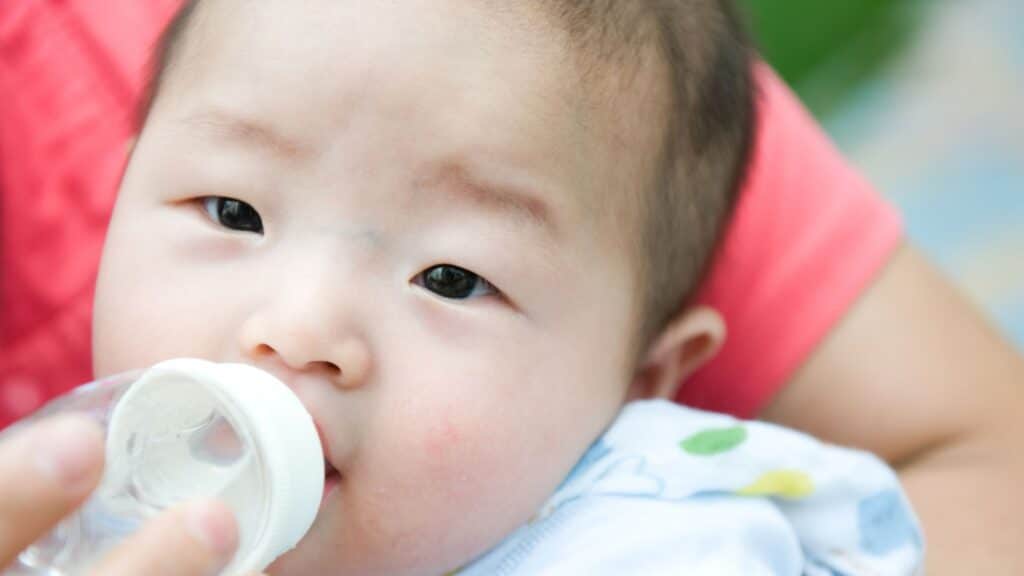
How Water Supports a Nourished Newborn
While the role of breastfeeding or formula feeding in a newborn’s diet is emphasized, the topic of water is often left untouched. Let’s get a deeper understanding of when and why water becomes relevant in a newborn’s life.
Understanding the Role of Water in a Newborn’s Early Nutrition
For newborns, breastmilk or infant formula provides all of the necessary hydration and nutrition. As such, newborns do not typically require additional water. Here are some reasons:
- Breastmilk and Formula Provide Hydration: Being made up of a significant percentage of water, these fulfill a newborn’s hydration needs entirely.
- Proper Nutrient Balance: Too much water can interfere with a baby’s ability to absorb the nutrients from breast milk or formula.
- Kidney Health: Newborns’ kidneys are not yet fully developed, and excessive water can strain them.
Introduction of Water to Complement Breastfeeding or Formula
As your baby grows and starts to explore the world of solids, around the six-month mark, it’s time to begin cautiously introducing water. However, remember that while water can complement your baby’s solid food intake, it is not a substitute for breastmilk or infant formula, which should remain the primary source of nutrition for babies under one year of age.
The introduction of water should go hand in hand with the introduction of solid foods around the six-month mark. The exact age, however, can vary, and it is essential to consult with your pediatrician to determine the appropriate time.
Remember, balance is key. Ensure to maintain an appropriate balance of solids, breastmilk (or infant formula), and water in your baby’s diet as they grow, and consult your healthcare provider for personalized advice on your baby’s nutritional needs.
Water should also be used for reconstituting powdered infant formula, following the instructions on the packaging carefully. Using the right amount of water is crucial for the accurate balance of nutrients. Always ensure the water you use is safe and free of contaminants, as newborns are particularly vulnerable to harmful waterborne pathogens. In areas of uncertainty about water quality, it may be advised to boil the water before using it to mix the formula.

Best Practices for Incorporating Water Into a Newborn’s Routine
When it becomes time to introduce water into your newborn’s routine, it’s critical to adhere to safe practices that safeguard their health. The type of water used and the method of giving it to your newborn play a significant role in their overall well-being.
The Types of Water Suitable for Newborns
Newborns do not require water beyond what they receive through breast milk or formula. However, when it becomes appropriate to give water, usually around six months of age, consider the following options:
- Tap Water: Tap water can be appropriate, provided it meets necessary safety standards, is from a reliable source, and has been tested for impurities. For newborns and infants, it’s generally advisable to boil tap water for 1-2 minutes and cool it to room temperature before using it in infant formula or for drinking.
- Filtered Water: If there are concerns about tap water quality in your area, a certified water filter can remove impurities and provide clean water for your baby.
- Bottled Water: In some circumstances, such as traveling or areas with questionable water safety, bottled water might be necessary. Always choose a brand low in sodium and fluoride, but bear in mind that not all bottled water is sterile. It should be boiled and cooled before being used for infants under six months of age.
Proper Bottle Usage for Offering Water
When you first introduce water, here are a few considerations:
- Choose an Age-Appropriate Bottle: Opt for a bottle designed specifically for babies of your child’s age.
- Inspect the Bottle: Check it for potential hazards – sharp edges, loose parts, or cracks that could pose a risk to your newborn.
- Clean and Sterilize: Before each use, thoroughly clean and sterilize the bottle to protect your baby from harmful germs.
- Avoid Overfilling: Start with a small amount of water, letting your baby get used to drinking water before gradually increasing the amount over time.
Remember, always consult with your pediatrician or trusted health or
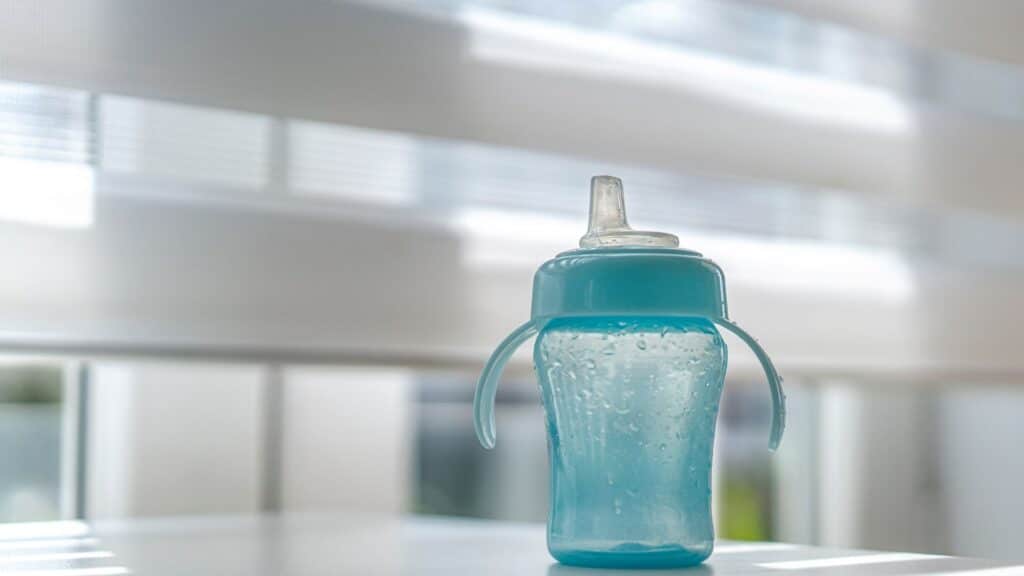
Establishing a Water Introduction Routine for Newborns
Ensuring proper hydration is essential for your baby’s health and well-being. As your baby grows and starts consuming solid foods, typically around six months of age, establishing a water introduction routine becomes crucial. Here’s how to do it:
Creating a Schedule for Water Introduction Alongside Meals
Begin by introducing water as a part of each meal. To do this:
- Coordinate with Solid Feeding Times: Once your baby starts consuming solid foods, offer a few sips of water during meals. This will help your baby become accustomed to drinking water alongside solids.
- Gradual Increase: As your baby gets used to drinking water, you can slowly increase the amount offered at each mealtime.
- Keep an Eye on Portions: Remember, water should not replace breast milk or formula but complement it. This will help prevent potential water intoxication by ensuring water is introduced in controlled amounts.
Monitoring Water Introduction and Staying Consistent
Consistency is key to establishing a water introduction routine for your baby. Here’s how to monitor their intake:
- Keep Track of Quantity: Make a note of how much water your baby is consuming at each feeding. This will ensure consistent monitoring of your baby’s water intake.
- Observe Your Baby: Watch for signs of hydration, such as regular wet diapers, a moist mouth and throat, and general activity levels. These are indicators that your baby is responding well to water consumption.
- Use Suitable Tools: Consider using marked cups or bottles that enable you to monitor your baby’s water intake accurately. In later stages, you may also introduce a sippy cup or straw cup for your baby to enhance their drinking skills.
Remember, the exact amount of water intake can vary depending on your baby’s weight, age, and individually assessed needs. Always consult with a healthcare professional or pediatrician to determine the right water introduction plan for your baby.
Establishing a regular routine can help ensure your baby stays adequately hydrated as they continue to grow and develop.
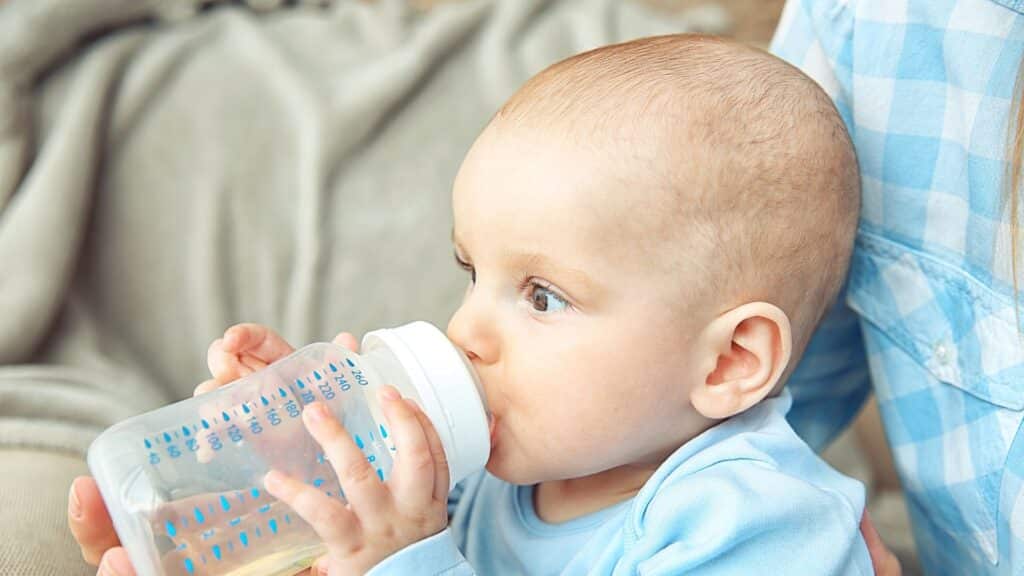
Overcoming Challenges in Water Introduction for Newborns
Establishing a water introduction routine for your newborn can pose certain challenges. However, with patience, understanding, and appropriate techniques, these hurdles can be managed.
Addressing Potential Refusal of Water by Your Baby
If your baby initially refuses water, there are several tactics you can try:
- Temperature Check: Ensure the water is at an appropriate temperature. Infants may be more accepting of lukewarm water as it closely resembles the temperature of breast milk or formula.
- Try Different Cups: If your baby doesn’t accept water from a sippy cup, consider transitioning to a small, regular cup or even a bottle they’re familiar with.
- Consider Adding Flavor: If your baby continues to reject plain water, a very small amount of fruit juice could be added to give the water some flavor. It’s essential, however, to always consult with your pediatrician before introducing juice into your baby’s diet.
Dealing With Concerns About Water Affecting Milk or Formula Intake
It’s valid to worry that your baby might drink less breast milk or formula if they start taking in water. Here’s how to address these concerns:
- Timing is Key: Offer water after or during meals, not before, to prevent your baby from filling up on water instead of food.
- Practice Portion Control: Control the amount of water you offer to ensure your baby still has room for their regular meals.
- Monitor Diaper Output: Keeping track of your baby’s diaper output can help you assess whether they’re getting enough nutrition.
Remember, the introduction of water should always be guided by the specific needs and timing suitable for your baby. Always follow your pediatrician’s advice and guidance.
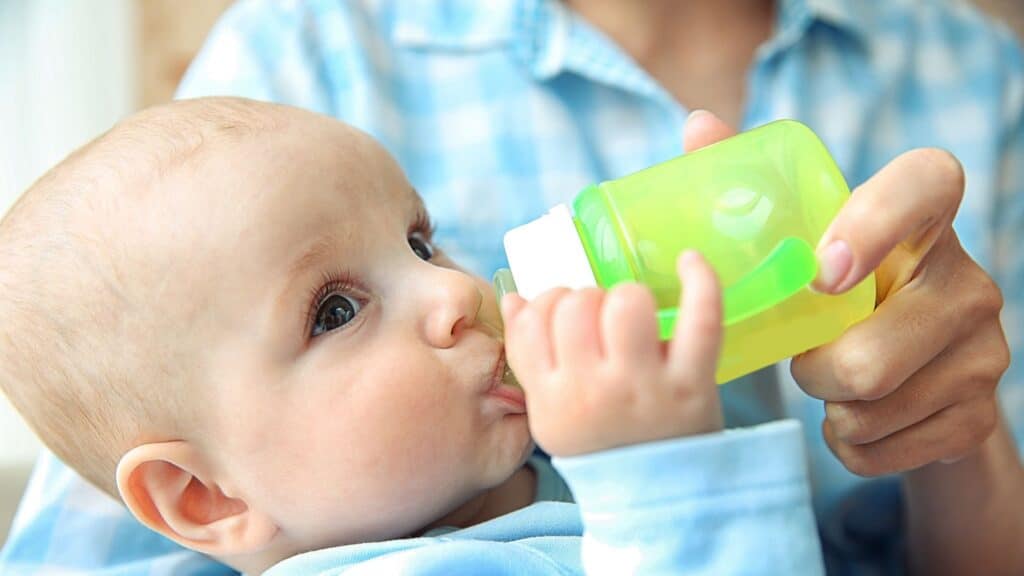
Hydration for Newborns in Different Climates
Maintaining proper hydration is essential for your baby’s overall well-being. Newborns typically do not need additional water other than breast milk or formula, but it’s essential to understand how weather conditions can impact hydration as your baby grows and starts consuming water.
Tips for Ensuring Proper Hydration in Various Weather Conditions
- Hot Weather: Monitor your baby’s fluid intake more closely during hotter months; as they grow and consume water, they may require extra fluids to compensate for fluid loss due to sweating.
- Cold Weather: Babies might not feel as thirsty in cold climates, so it’s crucial to offer water regularly to ensure proper hydration as they grow older and start consuming water.
- Dry Climates: In arid environments, adjust your baby’s fluid intake to counter the increased moisture loss through the skin and lungs as they grow and water becomes a part of their diet.
Adjusting Fluid Intake During Hot or Cold Weather
- Check for Signs of Dehydration: Recognize early dehydration signs, such as decreased urine output, dark urine, and irritability, and adjust fluid intake accordingly as your baby grows older and starts consuming water.
- Gradually Increase Intake: In extreme temperatures, gradually increase your baby’s fluid intake to help them acclimate once water becomes a part of their diet.
- Consult with a Healthcare Professional: If you’re unsure about the appropriate fluid intake for your baby in specific weather conditions, consult with your pediatrician to create a customized hydration plan.
Remember, each baby is unique, and hydration needs may vary depending on their individual circumstances. Always pay attention to your baby’s hydration cues and adjust as needed, following your pediatrician’s guidance.
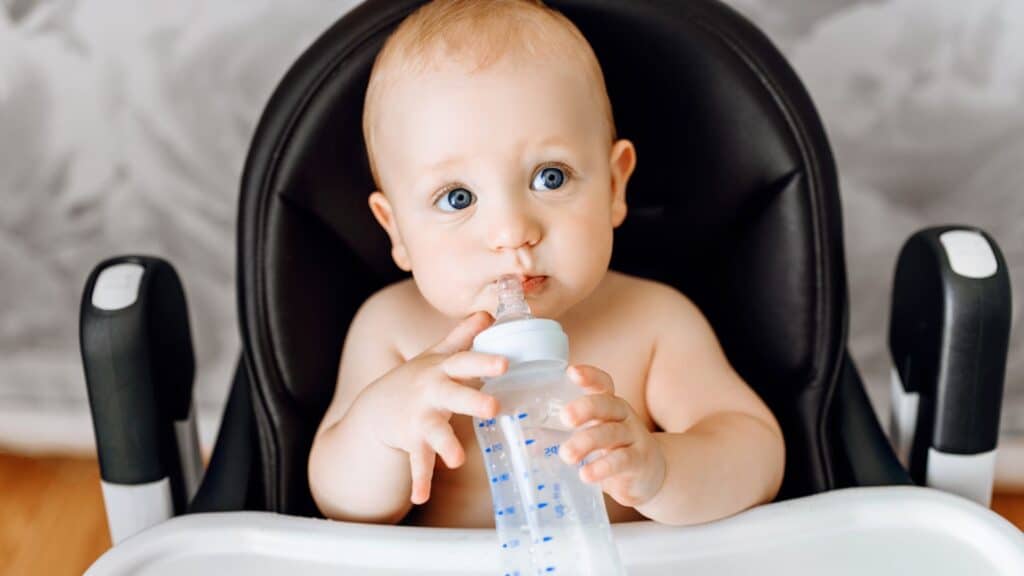
Conclusion
Introducing water to your newborn is a significant step that requires careful consideration and a measured approach. Recognizing the signs of readiness for water consumption and an understanding of the appropriate volume and timing of water introduction are critical aspects requiring the guidance of a healthcare professional, primarily a pediatrician.
Moreover, it’s important to understand that, for a newborn, water is not a replacement for but a complement to breast milk or formula. The role of appropriately selected types of water and their delivery methods can significantly impact your baby’s acceptance of drinking water and overall health.
Furthermore, establishing a routine for introducing water and maintaining consistency is key, particularly as your baby grows and the climatic conditions alter their hydration needs. Despite a well-established routine, facing and overcoming challenges will be part of this journey. Therefore, be open to trying various strategies and techniques to ensure a smooth transition.
This guide’s aim has been to provide new parents with the knowledge and assurance they need to navigate their way through the water introduction process for their newborns. Nevertheless, as every baby is different, always consult with qualified professionals for personalized advice tailored to your newborn’s unique needs.
As you introduce your baby to the world of hydration, we wish both of you a remarkable journey!
Would you like us to write more articles on this topic? Please let us know. If you have a question, we will do our best to answer it.



